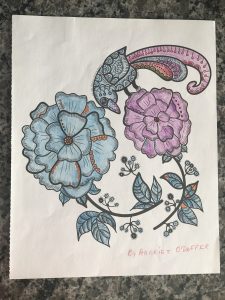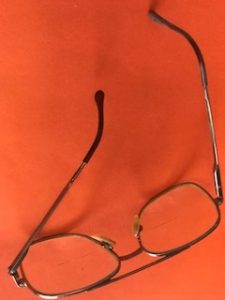One Guy’s Caregiver Experience
Recently I received a call from a caregiver group at our church. Since I had just ended a 13-year stint as caregiver for my wife Harriet who had Alzheimer’s, they asked me to talk to them about my experiences as a caregiver.
In the fall of 2007, my family and I noticed that Harriet, always attentive to details, was exhibiting an unusual amount of forgetfulness. She was soon diagnosed as having mild cognitive impairment.
Her neurologist told me that the mild cognitive impairment might or might not progress into Alzheimer’s. Only time would tell.
His prescribed drugs, Aricept and Namenda, were not curative and would only possibly slow the possible progression.
I’m not sure about slowing, because 13 years later Harriet had progressed through five of the five stages of Alzheimers, and died after a fall fractured her hip.
My Reservations
I delayed agreeing to talk to the caregiver group because I didn’t want to portray myself as some sort of expert.
The truth is that I probably know less about caregiving for Alzheimer’s than most because I relied primarily on just being there and seeing what was happening to discover effective ways to cope and deal with Harriet’s terrible situation.
But, I finally decided that I might have something to say that could help people cope with caring for someone with Alzheimer’s. So the following is an adaptation of what I said to the group.
The Terrible Progression of Alzheimer’s
According to a Mayo Clinic reference, Alzheimer’s Disease goes through five stages, progressing from only scientific detectable changes in the brain, through mild changes in memory/thinking ability, then through greater difficulty in completing/remembering complex tasks or ideas.
In the last two stages, the person shows significant changes in personality and behavior and needs total dependence upon others for personal care and existence.
The Brutal Truth About Alzheimer’s
As I began to understand what was happening to Harriet, I accepted the following two truisms, and they helped me clarify my task as a caregiver.
Truism 1: People with Alzheimer’s, especially in later stages, don’t do most of what they do on purpose, and generally can’t control their actions.
Now, before reading the second truism, think of the long list of all the normal things a person can do just prior to being diagnosed with the disease.
Truism 2: People with Alzheimer’s will probably not be able to do hardly any of these things at the end when the disease has run its course.
And you never really know in advance when they won’t be able to do something today that they were able to do yesterday. You, as caregiver, are a facilitator of transitions through the stages.
How Did I Want to Be As a Caregiver?
Remembering that “You can’t control what happens, but you can control how you react to it,” and knowing that I wanted Harriet’s terrible progression through the disease to be as kind, loving, and meaningful as possible, I decided to take the following vows.
Much like my marriage vows, they totally shaped my approach and attitude toward being Harriet’s caregiver.
Also, I decided early on that when something humorous came up, I would not feel guilty laughing about it. I always felt I was not laughing at Harriet, but rather laughing as a sort of rebellion against the horrible disease.
And I also felt it was much better in the situation to laugh than to cry. So if any of my incidents illustrating a vow strike a chord of humor in you, feel free to join me in a good laugh.
My Caregiver Vows
- I will always treat Harriet with Unwavering Kindness
Very early on in her disease, Harriet drove us to Walmart. I asked her to wait at the front while I went to buy something. When I returned, Harriet, and our car, were gone. She had driven home without me. I tested my first vow that day.
- I will always treat Harriet with Loving Acceptance
As I tried to get Harriet once to help me find her lost hearing aids, I noticed that she was vigorously chewing away on something. You guessed it, the hearing aid! This second vow kept me from lecturing her that chewing up your hearing aids is a no-no.
- I will always treat Harriet with Infinite Patience
At the dinner table in our senior living community, Harriet started taking her neighbors utensils and sometimes their food. I would carefully explain to her why she shouldn’t do this, and give them back, only to have her take them again, and again. Finally, finding a workable diversion solved the problem, and reinforced how much patience I was going to need.
- I will always foster Co-Decision Making when caring for Harriet
Rita, Harriet’s other caregiver, once bought Harriet a red top that looked like a common red handkerchief. Realizing it didn’t fit Harriet’s style, Rita decided to return it. The next day, Harriet turned to me, totally out of the blue, and said “I really like my new red top.” Needless to say, she wore that top the rest of her life.
- I will always try to Give Total Attention when helping Harriet
In the last stages of her disease, it got difficult getting Harriet to eat and drink enough. I can remember working with her for 20 extra minutes, just to get her to finish a glass of water or juice. You simply needed to “stick with it” and pull out all the stops so she would get nourishment and not get dehydrated.
6. I will always try to find ways to Welcome Laughter into Harriet’s care
Near the end of her life, I was feeding Harriet some amber colored chicken noodle soup when the TV tray got bumped and the soup spilled on my pants. Looking at the soup color and where it spilled on my pants, we both started laughing and got “too tickled to stop.” I really cherished that kind of laughter.
Digging a Little Deeper Into a Caregiver’s Role
Beyond being deliberate about my attitudes, some other things I found really important in caring for Harriet are listed below with illustrations.
Other Helpful Things a Caregiver Can Do
- Establish Consistent Patterns in daily activities
Harriet’s pattern for bedtime was: start at 8:30 pm, put on bedclothes, stop for a hug (tell her she is the best hugger in the world), put her in bed, and say a prayer (naming family and friends and affirming God’s love for her). I think this pattern was one reason why she was such a good sleeper.
- Keep Them Involved as long as possible
Harriet loved coloring, golf, driving the car, bridge, choir, crossword puzzles, reading, listening to music, poems, and watching sports. My goal was to keep her doing these things as long as she could do them. The following picture she colored halfway through her Alzheimer’s journey illustrates this.
(Click on the picture to see Harriet’s signature. Click the arrow in the upper left of the screen to return.)
3. Find Their Key and integrate it into their daily activities
Harriet’s key was music. One evening Harriet and I were sitting on the couch and I was running through the TV channels. I came to Pink concert and was focused on going right past it when I saw Harriet slapping her leg to the beat. Needless to say, Harriet and Pink really enjoyed the next half hour.
- Facilitate Their Transitions as smoothly as possible
Harriet always waited patiently outside the bathroom at the ISU basketball games while I finished inside. One night, as I started going out, Harriet started coming in. She was met by men, telling her in no uncertain terms, “Lady, you can’t come in here.” Clearly, another transition was upon us.
- Keep Them Connected to their past
I wrote this 23 page tribute to Harriet when she was halfway through her Alzheimer’s experience. I wanted her to be able to remember her past, and I wanted her kids and grandkids to remember her like she was pre-Alzheimer’s. Harriet looked at the booklet a lot with her family. I think she was proud of it.
Some Final Thoughts About Being a Caregiver
People always tell caregivers to “take care of themselves,” and that is certainly true. I totally bought into this, and looked for ways maintain some sensibility and balance in my life throughout the whole process. Here is what worked for me.
How to Keep Your Caregiver Sanity
- Make time for Yourself
Having Rita to help with Harriet for several hours each week was so valuable, for Harriet, Rita, me, and others. It certainly helped my golf game and my fun at the library. When my son Eric came on several occasions to stay with Harriet for a few days while I went places with my daughters, Rita helped him with certain things. Eric called her “Rita from Heaven.”
- Accept Help in Decision Making
From “When should we go to a retirement community?” to “Is it time for hospice?,” there are many decisions to be made. I was blessed to have a great relationship with three wise and wonderful adult children (Sue, Sara, and Eric) who fully participated in all those major decisions. It really helped.
3. Keep a Sense of Humor
As I picked Harriet up from a History Club meeting once at Al and Linda Bowman’s house, instead of her cute purple frame glasses, she had on a pair of larger, manly glasses. Al’s glasses? A large club–woman’s glasses? Nope. Mystery unsolved! Harriet and I had a good laugh. And I still have the glasses.
- Take Things in Stride
From asking Harriet to go in the bathroom and take off her hose for a pedicure and having her come out with both hose and pants off, to having her leave the car and go into a store while I was busy pumping gas, we all learned the importance of “taking things in stride” and “not sweating the small stuff.”
5. Treasure the Little Things
One time, Harriet, who was hurrying across the room, saw me on the couch, broke stride, came over to me, smiled, and pulled my big toe. Other times, in the same situation, she smiled, patted my leg, or gave me a “thumbs up.” I was always on the lookout for little things, like her saying, “He’s my husband.” That made all the difference for me.
6. Honor Your Loved One
Once my caregiver life was over, it was great therapy for me to honor Harriet for the things she put up with during her long bout with Alzheimer’s. I make a collage of pictures on one of my walls, accompanied by a tribute to Harriet. It gave me the final closure that all caregivers of loved ones must have.
A Tribute to Harriet, by Phares
Harriet, my special lady, died on September 27, 2020, after a 13 year battle with Alzheimer’s disease.
The photo above on the left is representative of her vibrant years as a wife, mother, teacher, friend, and amazing community volunteer –a liver and lover of life, and an acceptor of responsibility. It dramatically reminds me of her unwavering spirit of love, friendliness, helpfulness, cooperation, and love of adventure.
I can tell you for sure that she was, as she appears, a real winner — a truly wonderful woman.
The photo above on the right was taken in her latter stages of Alzheimer’s. I love the photo because the expression on her face also tells a story. With all the awful things she had to deal with in coping with this terrible disease, Harriet’s facial expression above reminds me how she tackled the disease with dignity, even when everything was against her.
Somehow, she found a way to rarely be angry, to maintain her pleasant look, pat me on the knee or pull my toe, and often sport a full fledged smile. I always felt, even in the toughest times, she was trying to be helpful, and make things for me as easy as she could.
So join me in this tribute to Harriet. She was special all her life!
Some Concluding Comments
I would be remiss not to emphasize how much the support of family and friends helps you as a caregiver.
In addition to our kids, the spouses of our kids, our grand kids, our friends, the staff at Luther Oaks, and many of our relatives were always very attentive to Harriet’s needs. They really gave her the time of day!
For example, our daughter-in-law, Stacy wrote Harriet an interactive card every day for long periods of time. It become a ritual for Harriet and I to read them and answer Stacy’s questions.
Harriet’s brother Jack and his wife Jean wrote Harriet a letter every week, and so did Harriet’s sister Ellen. Reading those letters with Harriet helped a lot.
In fact, I see all of these people as “assistant caregivers,” and treasure all of their input, much of which I haven’t mentioned.
A Final Caveat
If you are thinking that what I’ve told you in this post is too good to be true, you are a good judge of what it means to be human.
I set high standards for how I wanted to be as a caregiver and how I wanted to help Harriet cope with the suffering caused by Alzheimer’s.
I wasn’t perfect.
Sometimes, I look back on things and wished I had handled some of them differently. I even bent a vow a little now and then to accomplish what I thought I had to do.
But I always tried as hard as I could to keep my vows, have a good attitude, and create as pleasant and loving experience for Harriet as possible. And other people did too.
I think she noticed.






J. Gordon Bidner
Well Phares YOU set the standard for sure. As your reflected you might not have been perfect, but it wasn’t because you didn’t try! Yes, Harriet was special to you and others she interfaced with. She changed for sure, but still remained the same. Thanks for sharing your ‘Care Giver Thoughts’–valuable to contemplate and think about.
Bill hammitt
Reading this brought back my caregiving for my Mom. Mom and Harriet were both great women and to watch them go down hill was certainly not pleasant. One of the hardest things with Mom was when she started forgetting who we were. It started with those who could only see her periodically but then I noticed she was also loosing those who stopped to see her weekly. Then one day I was my Dad to her. In the last two and a half years she only knew me for less than 10 seconds one afternoon.